 Petzlover
Petzlover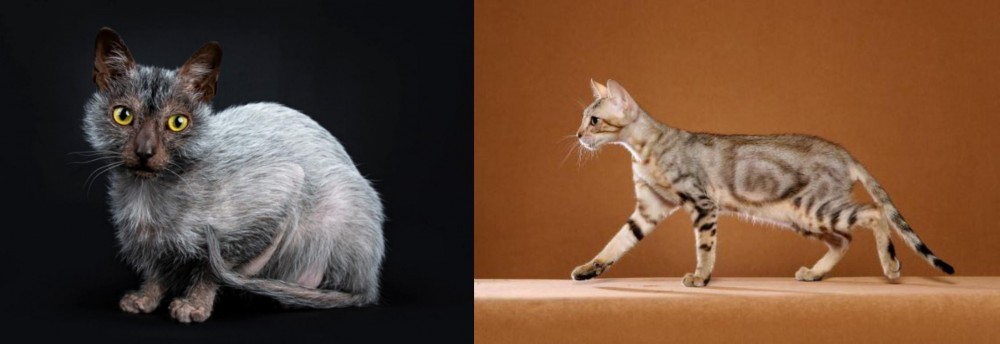 Both Lykoi and Sokoke are originated from United States. Both Lykoi and Sokoke are of same weight. Both Lykoi and Sokoke has almost same life span. Both Lykoi and Sokoke has same litter size. Lykoi requires Moderate Maintenance. But Sokoke requires Low Maintenance
Both Lykoi and Sokoke are originated from United States. Both Lykoi and Sokoke are of same weight. Both Lykoi and Sokoke has almost same life span. Both Lykoi and Sokoke has same litter size. Lykoi requires Moderate Maintenance. But Sokoke requires Low Maintenance
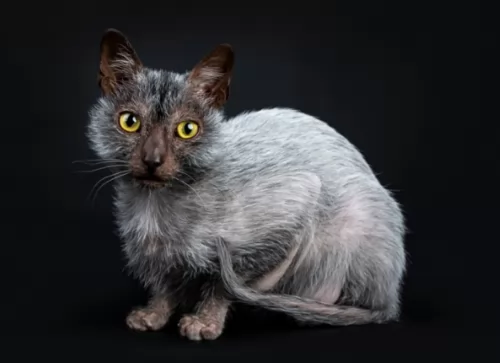 These cats were first discovered in 2010 in Virginia. It was Patti Thomas who named the breed Lykoi.
These cats were first discovered in 2010 in Virginia. It was Patti Thomas who named the breed Lykoi.
It was in 2012 that the cat breed went before the International Cat Association and is now recognized as a Championship Breed.
There is also work being done to expand the cat’s breeding program. It’s a naturally occurring gene in the feral cat population. There are still Lykoi cats born to the feral cat population.
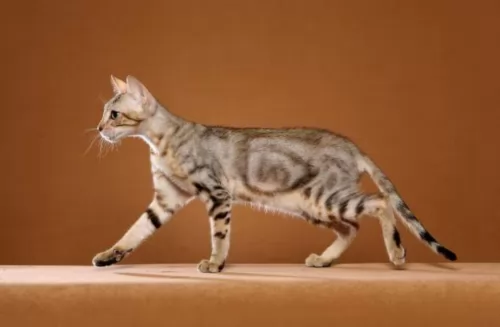 Compared to other breeds of cat, the rare Sokoke Forest Cat is a fairly new natural breed. It comes from the Sokoke district of eastern Kenya but was developed in the USA.
Compared to other breeds of cat, the rare Sokoke Forest Cat is a fairly new natural breed. It comes from the Sokoke district of eastern Kenya but was developed in the USA.
It is in fact, named after the Arabuko Sokoke National Forest, from where the wild foundation stock came from. Wildlife artist Jeni Slater started breeding these cats in the 1970s. They eventually reached Denmark, where further breeding continued, with the cat becoming popular with local cat fanciers, and laid the foundation of the breed in Europe.
Today, there are just a few breeders registered in the UK and TICA, The International Cat Association lists the Sokoke cat as a New Preliminary Race and it was recognized by FIFe in 1993.
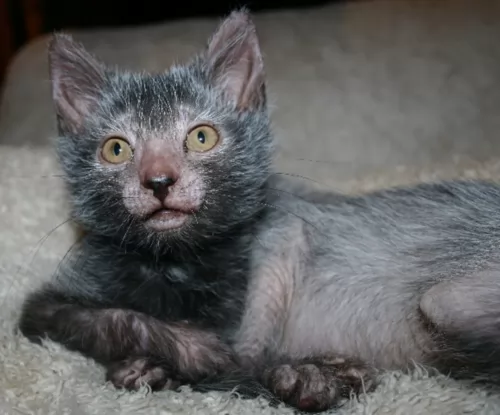 The Lykoi varies quite a bit in looks and you get some that are completely covered in hair and some that are actually partially hairless. Strangely, they are born with quite a lot of black fur.
The Lykoi varies quite a bit in looks and you get some that are completely covered in hair and some that are actually partially hairless. Strangely, they are born with quite a lot of black fur.
The cat has a solid black roan coat with no undercoat. Even though the cat is partially hairless, it molts a couple of times each year.
People are inclined to think that the little bit of hair would be wiry, when in fact it is soft and silky. It's just that it looks like bristles, but is actually not. People are always surprised by the coat's softness.
The Lykoi has a lean muscular body with large ears and eyes. He is a medium-sized cat and can weigh between 4 to 6kg.
The Lykoi is a friendly, people-oriented cat that is affectionate towards its human owners. This is also a playful cat breed and he is also intelligent and inquisitive.
The Lykoi is fond of his human family and makes a wonderful companion.
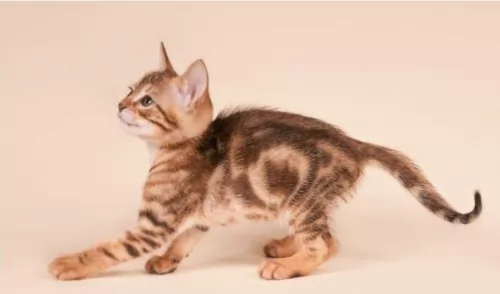 The Sokoke is a medium-sized cat with a long, lean body and slender legs. The hind legs are somewhat longer than the front legs. The head is smallish and round and he has a constantly alert look to him.
The Sokoke is a medium-sized cat with a long, lean body and slender legs. The hind legs are somewhat longer than the front legs. The head is smallish and round and he has a constantly alert look to him.
A striking characteristic of the Sokoke cat is its tabby fur, which people say looks like the bark of a tree and it is brindle in coloring.
The tail is medium to long and the ears are also fairly large, The eyes are large and almond-shaped and can be greenish to brown. The coat is short and coarse.
Cat lovers enjoy these playful, curious, intelligent, and family-orientated cats. In spite of their wild side, they adapt easily into different homes.
They’re inquisitive and will follow you, much like a dog. They will even enjoy a leash being put on them and being taken for a walk. They’re very sociable and vocal too and get on with everyone, children and other pets included.
They’re playful cats, loving to jump and climb and then look down at you from their high perches. Easily bored, you will need to provide fun and games continuously.
They enjoy being involved with everything you’re doing and form a strong bond with their owners. Because the Sokoke is social and affectionate, they require quite a lot of attention, and if they don’t get the attention they crave, they meow in anxiety.
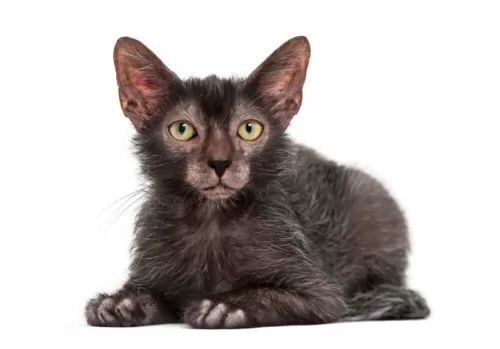 People who have owned the Lykoi say that they make a remarkable and devoted pet. They want a lot of attention and they’re willing to give attention as well.
People who have owned the Lykoi say that they make a remarkable and devoted pet. They want a lot of attention and they’re willing to give attention as well.
They’re social cats and want to spend time with their human companions. A cat that doesn’t receive the love and care it needs can become heartbroken and sick.
If you have one of these cats and your life has changed so that you can’t give it the attention it craves, at least provide it with a feline companion.
Cats aren’t all the aloof creatures they’re made out to be and your Lykoi is capable of making you a splendid companion.
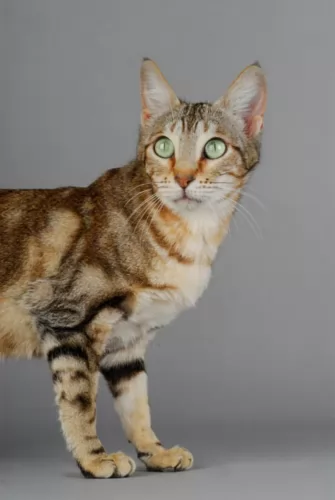 Your Sokoke is a very social cat and he will get on particularly well in a home with children who have been taught to be kind and gentle with animals.
Your Sokoke is a very social cat and he will get on particularly well in a home with children who have been taught to be kind and gentle with animals.
They are able to adapt well to homes where there are other pets too. They just love exercise and lots of fun. They don’t like being in a home where the owner is out at work all day. The solution to this is to provide him with another cat as a companion.
Sokoke cats are great with people of all ages, and when you bring one of these lively cats into your home, make sure he also receives his share of love and companionship.
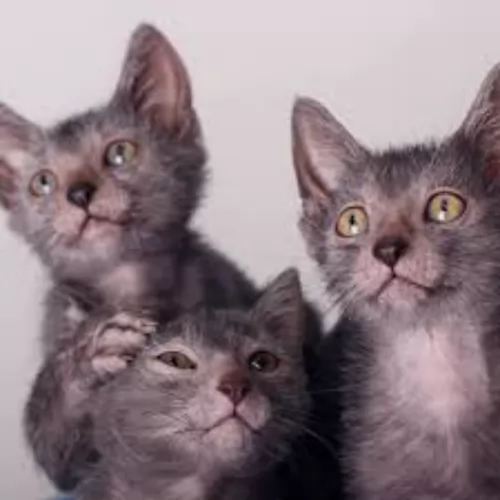 This cat is vulnerable to being cold and it should essentially be an indoor cat. If your Lykoi cat escapes, it can’t possibly keep warm on its own.
This cat is vulnerable to being cold and it should essentially be an indoor cat. If your Lykoi cat escapes, it can’t possibly keep warm on its own.
The Lykoi cat has not shown any specific health problems but being hairless, it is vulnerable to respiratory issues. Eye discharge as well as perpetual sneezing are characteristics of a cat with Feline Upper Respiratory Disease.
The cat’s mouth, sinuses, nasal passages, and upper airway are all affected. Your cat will need to get to the vet for a diagnosis and medical treatment. There are vaccines to prevent feline upper respiratory disease.
Any cat can develop this disease and your cat may have trouble breathing.
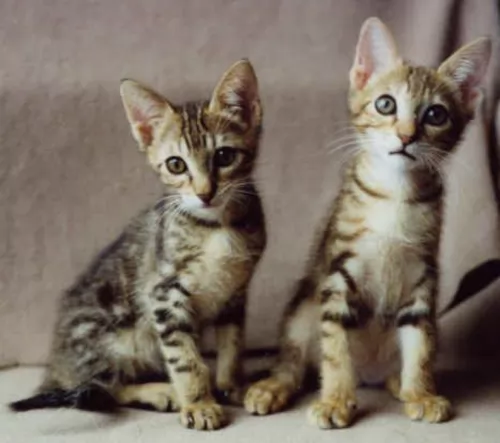 Sokoke cats are generally healthy and have no inherited diseases. To ensure that your Sokoke stands a chance of having a healthy life, you need to have him vaccinated against the life-threatening cat diseases there are.
Sokoke cats are generally healthy and have no inherited diseases. To ensure that your Sokoke stands a chance of having a healthy life, you need to have him vaccinated against the life-threatening cat diseases there are.
If your Sokoe cat isn’t his usual self day after day, make a point of getting him to the vet just as soon as possible.
Parasites are a terrible scourge with cats, and in fact, the number one cause of hair loss in cats is fleas. The bite of a flea can cause an allergic reaction. Your cat can become miserable with continuous biting, itching, and scratching and this can all lead to hair loss.
It is a wise move to speak to your vet about a good product to treat your furry friend with.
There can actually be many causes of diarrhea in cats and one of them is parasites, but it can also be caused by a viral infection or food allergy or something else.
You want to get your cat to the vet who can help you bring it under control. You may also have to feed your cat a bland kind of diet to help the cat’s digestive tract recover from the diarrhea.
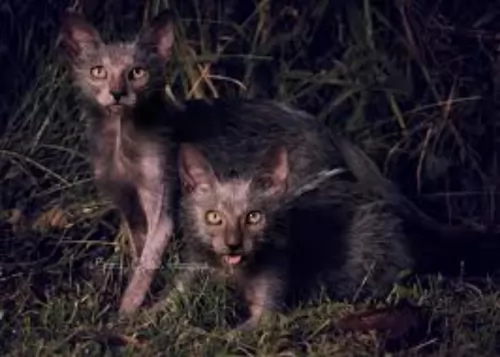 With the Lykoi’s lack of a coat, it isn’t going to require too much grooming. However, you have to keep a watch on this cat as without hair, he is vulnerable to sunburn and to getting cold.
With the Lykoi’s lack of a coat, it isn’t going to require too much grooming. However, you have to keep a watch on this cat as without hair, he is vulnerable to sunburn and to getting cold.
The cat has oily skin and it’s one cat breed that will need a bath occasionally. Some people recommend it once a week. Use warm water and a special pet shampoo recommended by your vet. Every trace of shampoo will need to be washed off to avoid the skin becoming irritated.
Provide your cat with food and water bowls, bedding, litter box, collar, grooming accessories and toys.
Cat food is a huge, important decision for any cat, as their very health depends on it. Commercially manufactured cat foods are available as wet and dry. Make sure you always get your cat food from a reliable source.
Some people believe in offering their cat both wet and dry options. Whatever you decide for your cat, remember that it needs to be at least 70% protein as every cat is a carnivore and requires a diet rich in protein.
If in any doubt, rather speak to your veterinarian and ensure that your Lykoi is getting the best food there is to promote good health. Always make sure that your cat has access to fresh cool water night and day.
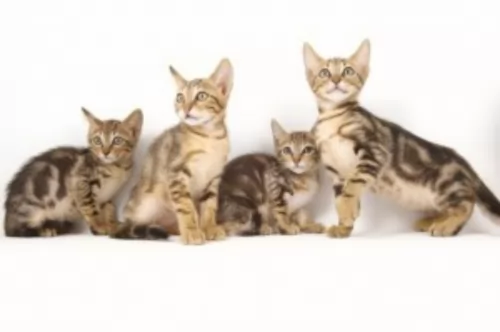 Because the Sokoke’s coat is short and close-lying, with little or no undercoat, brushing once a week will be sufficient.
Because the Sokoke’s coat is short and close-lying, with little or no undercoat, brushing once a week will be sufficient.
The Sokoke cat is very energetic, and he will need games, toys, and attention to keep him physically and mentally stimulated. They love climbing so a climbing tree and other kind of equipment will be a good idea.
Provide your cat with a litter box and ensure it is kept scrupulously clean by removing the cat’s feces every single day.
Diet is of critical importance to the health and happiness of a cat. Some people try to feed their cats human foods and wonder why their cat is continuously sick. A cat is a carnivore and he requires meat.
You can speak to your vet about the best kind of commercial cat food there is for your cat. Read the label and feed him portion-sizes as directed.